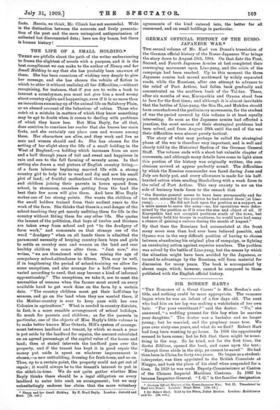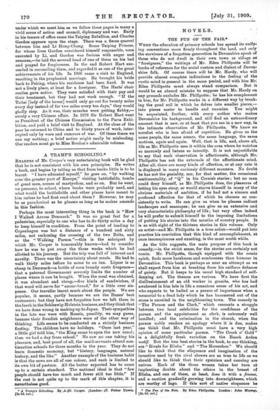SIR ROBERT HART.t
" THE Romance of a Great Career" is Miss Bredon's sub- title, and nothing could be more appropriate. The romance began when be was an infant of a few days • old. The aunt who bad him on her lap was making a watchchain of her own hair. "For your sweetheart P" said the doctor. " No," she answered, " a wedding present for this boy when he marries your daughter." The doctor was a bachelor and no longer young ; but he married, and the prophecy came true. We pass over sixty-one years, and what do we find ? Robert Hart had long been wanting to go home. In 1896 the opportunity seemed to have come; but he felt that there might be some- thing in the way. So he tried, not for the first time, the Sortes Biblicae, opened the book, and came upon the text: "Except these abide in the ship, ye cannot be saved." He had then been in China for forty-two years. He began as a student- interpreter, was then appointed to the British Consulate, at Ningpo, and took the place of his chief when suspended for a time. In 1859 he was made Deputy-Commissioner at Canton of the Chinese Imperial Maritime Customs. In 1863 he became Inspector-General. "I. G.': is the familiar. designation German Official History of the Russo-Japanese War. VoL U. Translated by Earl von Donut. London : Hugh Rees. [10s. ed.] Sir Hobert Hart. Told by his Niece, Juliet Bredon. London : Hutchinson and Co. Ds. net.
under which we meet him as we follow these pages in many a vivid scene of action and council, diplomacy and war. Early in his tenure of office came the Taiping Rebellion, and Charles Gordon appears upon the stage. There was a fierce quarrel between him and Li Hung-Chang. Seine Taiping Princes, for whose lives Gordon considered himself responsible, were executed by Li, and Gordon was furious with anger and remorse,—he laid the severed head of one of them on his bed and prayed for forgiveness. In the end Robert Hart suc- ceeded in reconciling them, and regarded it as one of the great achievements of his life. In 1866 came a visit to England, resulting in the prophesied marriage. He brought his bride back to Peking, where his residence had been fixed. It was not a lively place, at least for a foreigner. The Harts' chair coolies gave notice. They were satisfied with their pay and their treatment, but they had not work enough. " If the Taitai [lady of the house] would only go out for twenty miles every day instead of for two miles every ten days," they would gladly stop. As it was, their muscles were getting flabby,— surely a very Chinese affair. In 1878 Sir Robert Hart went as President of the Chinese Commission to the Paris Exhi- bition, and paid a brief visit to England. At the close of the year be returned to China and to thirty years of work, inter- rupted only by wars and rumours of war. Of these times we can say nothing; a brief notice might easily be misleading. Our readers must go to Miss Bredon's admirable volume.







































 Previous page
Previous page